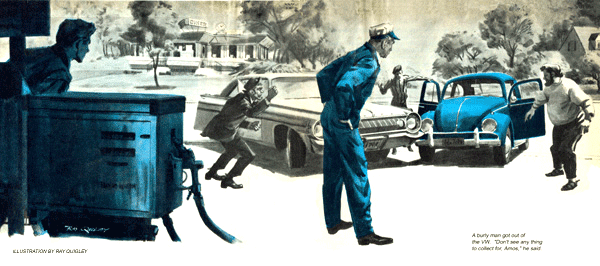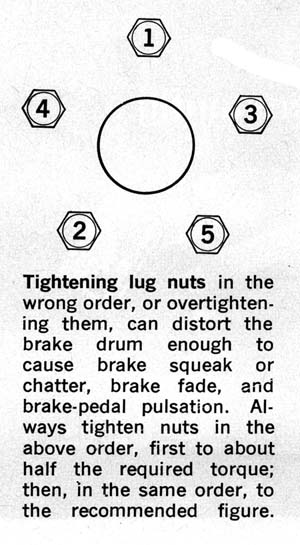August 1966
GUS GOES FOR
DOUBLE OR NOTHING
by Martin Bunn
When the town tightwad
runs into a bearded beatnik
in front of the Model Garage,
want to bet Gus can stay out of it?

Lounging in the doorway of the Model Garage for a breath of air, Gus Wilson watched his helper, Stan Hicks, finish servicing a car at the pumps. As it drove off, Stan came over, grinning.
"That Mrs. Finlay! Oil down two quarts, and all she wants is gas. 'My husband buys all the oil,' says she."
"What did you do?" asked Gus.
"Used all my sales appeal to sell her one quart," said Stan.
"So your sales appeal was 50 percent off, but you get A for effort."
"Anyway, it's quiet," remarked Stan. "No rush jobs or kooky customers."
Idly, Gus watched a Volkswagen approach.
"I take it back!" muttered Stan, looking the other way. "There's Silas Barnstable in his latest car. When I passed his house last night he was jumping on a lug wrench to tighten the nuts on the right front wheel. Bet you a Coke he's headed here."
"No takers," grunted Gus, shifting his glance to the bigger car -- a two-year-old Dodge. It was driven by a character generally rated as the stingiest man in town, and by Gus as his most trying customer.
The Dodge slowed as if about to turn in. So did the VW. Evidently the VW's driver also assumed the Dodge was turning in, for he steered directly in front of it. Barnstable, heading for the shop door, apparently didn't notice the smaller car and kept straight on. At low speed, the impact was moderate.
Gus and Stan walked over to where the cars stood, halfway across the curb line. The VW's bumper was tucked under one end of the bigger cars like a fledgling trying to get under a mother bird's wing. To Gus's practiced eye the damage looked minimal -- a little scraped plating.
Silas hunched himself across the seat to get out of the car, hopping mad.
"You're both witnesses," he sputtered, his seamed face twitching. "This feller ran smack into me. Plumb reckless he is."
"Take it easy, Silas," said Gus. "There doesn't seem to be any real damage."
"'Course there is!" barked Silas. "You can't smack a car like he did without doin' damage, and I aim to collect fer it."
Both doors of the Volkswagen swung open. From the right one emerged a slim young fellow in striped shirt, tight pants, and beret. From the driver's side, towering above the little car, came a burly, hatless young man with a Henry-the-Eighth beard. He peered good-naturedly at the impacted bumpers and turned to his friend.
"Don't see anything to collect for, Amos. You see anything we can collect for?"
"Nope. Didn't hit us hard enough, Fats."
"It's me who'll collect!" cried Silas. "Gus, you take my car out and -- and see if there ain't somethin' wrong with it."
"First, let's get both off the street."
Scowling furiously, Silas backed off his car and drove it to one side. The bearded young man got behind the VW, its engine stilled now, and leaned mightily. Guided by the slim Amos, the Beetle rolled alongside a wall.
"Go on, Gus," fussed Barnstable. "You try my car while I watch these fellers."
Gus got into the Dodge and drove out. As he had expected, there was nothing in the handling of the car to suggest any damage.
But as he tried the brakes, a repetitive squeak came from up front. He drove a little faster and tried the brakes again. The squeak was a chatter now, and the brake pedal pulsed under his foot.
"How about it?" demanded Barnstable.
"The brake noise?" asked Gus. "Nothing to do with that run-in you just had."
"They hit the front end and knocked it akilter," howled Silas. "I'll go to court."
"Come off it," said Gus impatiently. "You had that brake chatter before. That's why you came here in the first place."
"Jest drivin' by," snapped Silas. "I never meant to stop. I took that car in for four mortgage payments, and it's costing me money every minute it ain't sold."
"Okay, we'll fix it," declared Gus. "But don't ask me to help you blame somebody for an accident half your own fault."
Gus turned to the two strangers. "Did you just stop in by accident, too?"
"Reason we swung in front of the man was our engine just died," replied Amos, "and Fats was trying to coast in."
"I tried their battery, Boss," put in Stan. "It's stone dead."
"Why didn't you put it on a quick charge then?" asked Gus.
"Er -- it's sort of a special case," said the big man. "We got us just enough money for gas and hamburgers to Florida, and our buggy's let us down. The generator's quit, so we've been running on battery juice and the battery's gone stone cold."
"That's why we're sorry," added Amos, "that there's no damage to collect for."
Gus pulled an ear thoughtfully. "Stan, might as well have the battery charging."
"How about my car?" demanded Silas angrily. "I'm a regular, not no fly-by-night."
"I know the kind of customer you are," said Gus. "You came here to get that brake fixed, because you knew any prospective buyer would spot it. When the accident happened, you grabbed the chance to saddle someone else with the bill. That sort of ties two problems up."
Barnstable snorted, but moved aside as Stan moved out the charger, lifted a huge guitar case from the VW's back seat, and hooked up the battery.
"Did you have the generator checked at all?" Gus asked the bearded man.
"For sure. At a VW agency this a.m. They said the brushes are worn so short they don't lean on the commutator enough -- bad news, a two-three hour job, the man said, which we have not the wherewithal for."
"Not to get to Florida by Friday," put in Amos. "This is Fats Milligan, the folk singer. He's got a radio job down Tamiami way starting then. We can just make it by driving day and night."
"Which we cannot do with a generator that does not put out," added Fats. "But a cat at a diner tells us you make like a miracle man, so here we are."
Barnstable snorted again. "'Tain't no two-three hour job to put in a brush."
"It is on this car," returned Gus. "The brush terminal is inside the generator. You can't reach it without taking the generator apart.
You can't do that without taking it off. And you can't take it off without lifting up the fan housing. To do that you have to remove the carburetor and a lot of other stuff -- a long job. It's one place the VW engineers goofed."
Opening the VW's engine compartment, Gus lifted the brush spring with a bent wire, then drew the brush up by its pigtail lead.
Turning the brush to align it with the cooling slot, he pulled it out, the pigtail still connected inside. The brush was worn so short that the pigtail evidently "hung up" on the edge of the holder, keeping the brush from touching the commutator.
Someone poked Gus's arm. Letting the brush dangle, he turned to face Silas.
"When're you getting to my car?"
"Soon as you level with me," said Gus. "How long has it been squeaking?"
"Jest got it yesterday. Never heard no squeak while I drove it home -- only this morning. What d'you think makes it?"
"A distorted brake drum," replied Gus.
Barnstable slapped his leg. "Knew I was bein' soft-hearted when I took the car instead of cash. Feller's comin' to look at it after lunch. How long'll it take you to fix it?"
"Not long, but the VW's ahead of it."
Silas glared. "Them deadbeats can't even pay you. I'll give you five bucks to fix that noise before the noon whistle."
"You're on, Silas," agreed Gus, grinning.
Moving briskly, Gus rolled out a jack. The right front tire was evidently newer than the left -- its tread was both deeper and cleaner. Gus left the wheel on the ground while he loosened the five lug nuts.
Three were very tight. When all were free, he jacked up the wheel. Using a torque wrench, he tightened the nuts to 30-foot-pounds in crisscross order -- first the top one, then the left-hand bottom, the right-hand upper, the left-hand upper, and finally the right-hand lower one.
Then he cinched up the top nut to 65 foot-pounds. In the same sequence as before, he tightened the others to that figure. Then he removed the jack, and drove off.
Repeated braking at low and medium speeds produced neither squeaking nor pedal pulsing. Gus drove back. As he pulled up beside Silas, the noon whistle blew.
"There it goes!" crowed Silas. "And you never even started on the brakes. Didn't know the clock on the diner's slow, did ye? Now you got to fix it free."
"I knew," said Gus. "It's fixed."
"You never worked on the brakes or the brake drums!" protested Silas.
"Sure I did. When you put on the spare -- probably because it looked better than the tire you took off -- you overtightened the lug nuts. Maybe in the wrong sequence, too. That warped the brake drum out of shape and it didn't run true.
"I loosened the nuts and retightened them properly, letting the drum snap back. Overtightening the way you did could have stripped the threads. Even without a torque wrench, you can try to tighten nuts reasonably the same, and in the right order."
Glowering, Silas paid the 10 dollars.
The big folk singer, slouched in a chair near the shop door, looked up at Gus.
"Time's arunning. You got a miracle for us?"
"Thinking one up now," responded Gus.
With a box of assorted brushes, a hacksaw, and a file, he went back to the Volkswagen. By comparison with the worn brush, he found a new one of the same thickness and end curvature. Cutting this end off to a length about that of the worn brush, he filed cut end flat and parallel. With thin-nosed pliers he worked the reshaped piece through the generator slot and slid it, curved end first, into the holder.
Next he filed the curved end of the old brush flat. Then he slid it back on top of the new section and replaced the spring.
He unhooked the battery charger, replaced the rear seat and put back the guitar.
The engine started, and almost at once the generator warning light blinked out.
"Hey, man!" crowed Amos. "A miracle!"
"Should get you to Florida, but remember -- get new brushes soon," warned Gus.
"No problem, when Fats is working. But we're on half rations now. Hit us easy."
"It's on the house. That Dodge owner," said Gus deadpan, "insisted on paying for your job as well."
END
